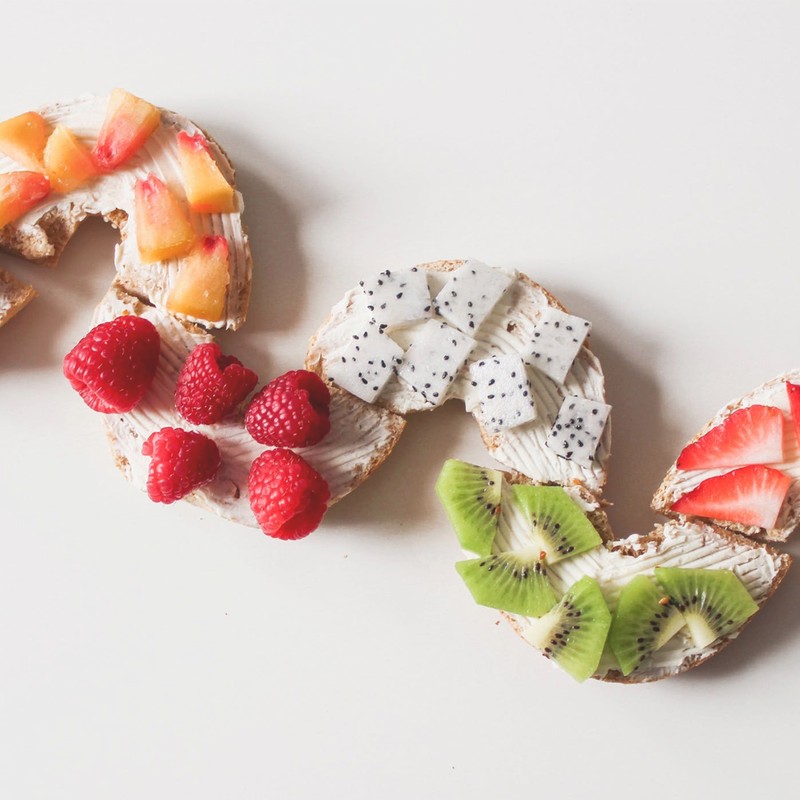10 Expert-Approved Snacking Tips
1. Be Balanced
An ideal snack should contain a combination of protein and a small amount of healthy fats, and would ideally be relatively low in sugar to help keep you fuller for longer. This combination will help to balance your blood sugar and energy levels throughout the day. Ideally, you’re looking for a snack with around 5-8g of protein, less than 5g of sugar (per 100g) and less than 5g of saturated fat. Remember calories aren’t everything – a high sugar snack may be low in calories but won’t necessarily keep you full, so try and focus on the micronutrients.
2. Forget low-fat
The biggest mistake women make is reaching for snacks labelled as low-fat or low-calorie. These foods are typically higher in sugar which will spike your blood sugar levels, causing you to feel hungrier sooner. As a result you’ll reach for another snack, so try to avoid where possible.
3. Quash Your Cravings
If you’re really craving something sweet opt for snacks with natural sugars, which are also high in fibre and protein to help with blood sugar balance. Some examples include: energy balls (made with dates and nuts), an apple with nut butter and cinnamon (cinnamon helps to balance blood sugar) or Greek yoghurt with berries and cinnamon. Try also opting for herbal tea to satisfy your sweet tooth.
4. Don’t Dismiss Popcorn
Snacks like rice cakes and popcorn aren’t the most nutritiously dense snacks, but are very low calorie and can help to take the edge off hunger pangs between meals. They can also be helpful during the times of the month when you may want to snack more regularly and eat in higher volumes but without the calories.
5. Know The Good Brands
If you’re out and about and need to buy a snack, keep an eye out for Squirrel Sister bars, Emily vegetable crisps, Brave Food peas (these are packed with protein and will keep you really full), Nush almond yoghurt tubes and Pip & Nut’s nut butter sachets. If you need a sweet fix, Plenish’s chocolate almond milk is great – just steer clear of ‘healthy’ snacks, which are often loaded with unrefined sugars.
6. Be Careful Of Nut Butter
Nut butter is one of those foods which is easily over-consumed – it’s a classic example of ‘just one more spoonful’ and before you know it you’ve eaten half the jar. One portion equates to one or two tablespoons, which is around 15-30g. If you’re spreading it on apples, bananas or rice cakes, one tablespoon should be plenty. It’s the same with avocados – while they’re a great source of healthy fats as well as vitamins A and E, they're also high in calories – a serving is half a small avocado or a third of a normal avocado.
7. Gluten-Free Isn’t Always The Better Option
Just because something is gluten-free or dairy-free doesn’t instantly make it the healthier option. Often free-from products are loaded with sugars and artificial additives. If you’re about to buy a gluten-free granola bar, a homemade date and nut bar is far healthier. The same goes for protein bars and snacks – these are often loaded with artificial sugars and chemicals, so instead opt for a handful of nuts and seeds or a boiled egg for a protein fix.
8. Everyone’s Different
When it comes to snacking, there’s no one-size-fits-all answer. Some find snacking helps to control their blood sugar levels, prevent cravings and reduce over-eating at meal times, while others don’t get hungry between meals and don’t feel the need to snack. Make an effort to listen to your body and think about whether you really need to snack – often it could be dehydration. If you find yourself needing a snack within three hours of a meal, it’s likely you haven’t eaten enough, so make sure you’re eating an adequate balance of protein, healthy fats and carbs.
9. Snack Mindfully
Our habits can get in the way when we want to make healthy changes. Try to bring mindfulness to your habits by making an effort to notice your triggers. At 4pm, do you instinctively go to the office kitchen for a treat? Start changing the habit by drinking a glass of water or a cup of tea instead.
10. It’s Ok To Treat Yourself
Try not to beat yourself up too much about snacking – if you’re eating an overall healthy diet high in vegetables, fruits, good quality protein, complex carbohydrates and healthy fats then the odd bag of crisps or biscuits isn’t an issue. The risks arise when your diet is high in refined carbohydrates, takeaways, processed meats, trans fats and sugar.
For more information visit JennaHopeNutrition.com
DISCLAIMER: We endeavour to always credit the correct original source of every image we use. If you think a credit may be incorrect, please contact us at info@sheerluxe.com.


